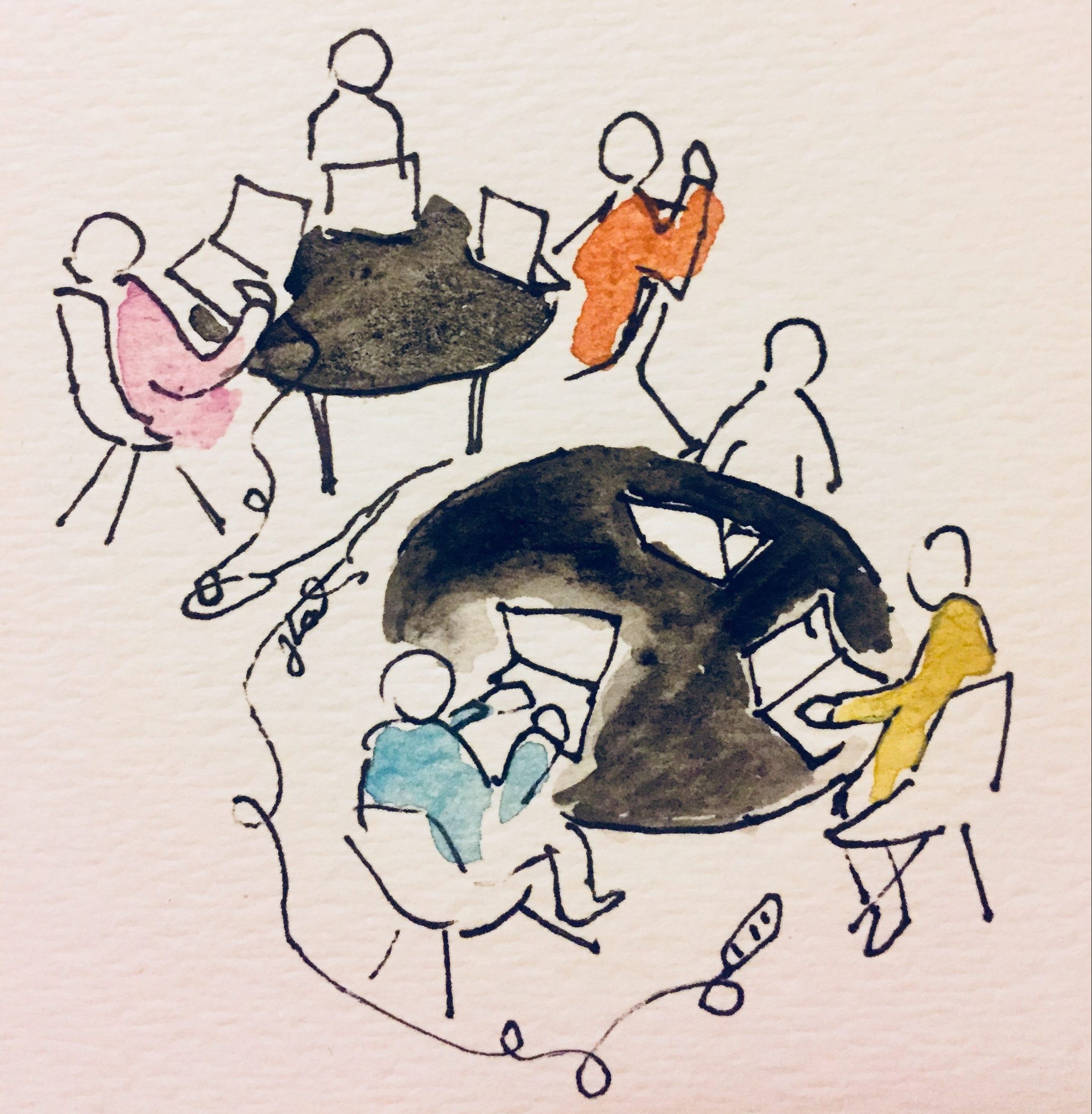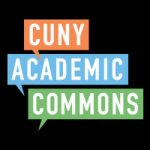Greetings Digital GC – Welcome back!
The Graduate Center Digital Initiatives (GCDI) and GC Digital Fellows have been hard at work developing programming, events, workshops, and opportunities to help you continue to learn and to develop your digital scholarly projects.
As you transition back to the academic year, please take a moment to review what has changed, what has stayed the same, and how you can continue to find the same support and encouragement for your work that you’ve come to expect from us! The best way to stay connected is to check the GCDI website regularly. There, you will find all of our workshops, events, and grant opportunities on our calendar, as well as a slew of online resources to support your work this semester.
You can also join us for a growing list of virtual events this semester! Don’t miss our GC Digital Scholarship Lab Virtual Open House on Wednesday, September 15th. It will be offered at three different times: 12-1 PM, 2-3 PM, and 4-5 PM. This event is free and open to the entire Graduate Center community; however, registration is required. When you come, you can expect to hear a short presentation about what GCDI offers, meet and chat with the Fellows, tour the programs we have to offer, and learn about how you can be more involved with the GCDI community.
The variety of our offerings means we have something for everyone. This semester we will be offering virtual workshops, as well as one-on-one consultations. We will also still be offering support through our working groups, such as the R User’s Group (RUG), the Python User’s Group (PUG), the Sound Studies and Methods Working Group, the Digital Archives Research Collective (DARC), and the GIS/Mapping Working Group. Our offerings are open to GC scholars at all levels of digital experience, including students at all stages of graduate research, as well as faculty and staff. Whether you are digitally driven, curious, or defiant, we hope you’ll join us!.
Below we’ve highlighted a number of upcoming events and opportunities that may interest you. We also encourage you to join the GCDI Group on the Commons for regular updates, to follow us on Twitter (@Digital_Fellows, @cunygcdi), to be on the lookout for regular updates about our programs shared through your program’s listserv. It’s always good to know what’s going on with the GCDI, because you, yes you, are the #digitalGC.
Looking for assistance with your digital project? Try one of these:
One-on-one Consultations
Have a question about your digital project? GCDI staff are available to meet remotely – via Zoom, Teams, or phone – with GC students, faculty, and staff to talk through technical challenges as the university continues to conduct remote teaching, research, and work. Sign up for a 30-minute consultation through this form.
Open House
We will host an Open House at the GC Digital Scholarship Lab at the beginning of each year to introduce folks to the various resources GC Digital Initiatives has to offer and to assist individuals with questions related to their digital project. Our Fall 2021 Digital Scholarship Lab Open House will be held virtually on Wednesday, September 15th from 12-1 PM, 2-3 PM, and 4-5 PM. Check out our event page for more information about registration and what to expect!!
Looking for a community to learn with?
We have several working groups that focus on specific interests. Working groups are composed of students, faculty, and staff who are looking for other scholars with similar interests to share resources, advice and opportunities. These interdisciplinary groups connect through the CUNY Academic Commons, and some have developed Slack workspaces to keep in touch. Regular remote meeting dates are forthcoming and can be found on our calendar.
These groups include the Python User’s Group (PUG), the GIS/Mapping Working Group, the R User’s Group (RUG), the Digital Archives Research Collective (DARC), Humanidades Digitales (DH in Spanish), and Sound Studies and Methods Working Group. No experience is needed to join; only an interest in the central topic and community. Do also check out our blog post on how to get the most out of our working groups.
Want to get involved beyond the Graduate Center? Visit our Participate page to learn more about each of these groups and groups across CUNY and NYC!
Workshops

This year, GCDI will offer hands-on, remote online workshops on digital research tools for people of all skill levels. Workshops are free and open to any member of the Graduate Center community. Registration is required, and information about how to register can be found on our website.
This semester we are offering 8 workshops across September to November. These include:
Tools for the Digital Humanities // September 17 @ 1 – 2 pm
Introduction to Python // September 23 @ 11 – 1 pm
Intro to R and RStudio // October 1 @ 3 – 4:30 pm
Creating interactive, visual, data driven websites in WordPress // October 7 @ 2 – 3:30 pm
Foundations of Microsoft Excel // October 20 @ 4 – 5:30 pm
Basic Audio Editing with Audacity // October 21 @ 11 – 12:30 pm
Intro to Educational Game Design // October 28 @ 3 – 4:30 pm
Intro to GIS // TBD
In order to be as responsive as possible, workshop space is limited, so:
1) Be sure to register on Eventbrite when you know you want to attend and;
2) If you realize you can’t make it, please cancel your RSVP so someone else can attend!
CUNY and GC Resources
Manifold Scholarship
![]() As CUNY students, you have the edge on Manifold, the Andrew W. Mellon Foundation-funded collaboration with the GC, University of Minnesota Press, and Cast Iron Coding. CUNY hosts its own instance of the open-source platform with opportunities for publishing teaching editions of public domain texts (like The Narrative of the Life of Frederick Douglass), teaching handbooks (Teach@CUNY Handbook), journal publishing and peer review, and Open Educational Resources. Manifold is a web application that allows administrators to create a library of projects containing texts and resources. Each text in a project can be read and annotated using Manifold’s reader. To read more about the project, its development, and the university presses using it: follow Manifold on GitHub and Twitter, join the Building Manifold Development Blog, join the Manifold Community Slack channel, and visit the Manifold website for current documentation. You can also contact Manifold Co-PI Matthew K. Gold or Manifold Digital Fellow Jojo Karlin.
As CUNY students, you have the edge on Manifold, the Andrew W. Mellon Foundation-funded collaboration with the GC, University of Minnesota Press, and Cast Iron Coding. CUNY hosts its own instance of the open-source platform with opportunities for publishing teaching editions of public domain texts (like The Narrative of the Life of Frederick Douglass), teaching handbooks (Teach@CUNY Handbook), journal publishing and peer review, and Open Educational Resources. Manifold is a web application that allows administrators to create a library of projects containing texts and resources. Each text in a project can be read and annotated using Manifold’s reader. To read more about the project, its development, and the university presses using it: follow Manifold on GitHub and Twitter, join the Building Manifold Development Blog, join the Manifold Community Slack channel, and visit the Manifold website for current documentation. You can also contact Manifold Co-PI Matthew K. Gold or Manifold Digital Fellow Jojo Karlin.
CUNY Academic Commons
 As a CUNY student, you are eligible for an account on the CUNY Academic Commons. The Commons is a CUNY-generated platform for building websites, connecting with peers, creating and joining groups, collaborating on papers, and learning about various spaces at the GC and beyond. If you’re new to CUNY, check out the Commons Basics guide. Not only are you welcome to create your own sites (for free!) using the WordPress framework, but you are also encouraged to take advantage of group capabilities to share files, host private discussion forums for special interest groups, and link up across groups. With the new invitation system, teaching on the Commons is easier than ever. Check out this blog post by Stephen Real of the Commons team. For updates, follow the CUNY Academic Commons on Twitter.
As a CUNY student, you are eligible for an account on the CUNY Academic Commons. The Commons is a CUNY-generated platform for building websites, connecting with peers, creating and joining groups, collaborating on papers, and learning about various spaces at the GC and beyond. If you’re new to CUNY, check out the Commons Basics guide. Not only are you welcome to create your own sites (for free!) using the WordPress framework, but you are also encouraged to take advantage of group capabilities to share files, host private discussion forums for special interest groups, and link up across groups. With the new invitation system, teaching on the Commons is easier than ever. Check out this blog post by Stephen Real of the Commons team. For updates, follow the CUNY Academic Commons on Twitter.
GC Resources and Centers
Among the other acronyms, you might see associated with GCDI are some amazing partners — the Teaching and Learning Center (TLC), the Interactive Technology and Pedagogy (ITP) certificate program, the Futures Initiative, the Center for the Humanities, and the New Media Lab. The GC Library also offers great workshops, this nifty digital tools guide, and consultation with Data and Digital Projects Librarian Steve Zweibel. The in-house Journal of Interactive Technology and Pedagogy also provides great articles and tool tips for incorporating digital methods in your teaching.
We encourage you to consult the Commons events calendar for all workshops.
GCDI Online Resources

While we are not physically at the GC, there are a number of asynchronous GCDI resources you can use! Our resources include tutorials, handouts, and reflections that cover topics such topics, tools, and methods as data and databases, research design, mapping, programming (including python and R), project management, sound recording, sharing, and analysis, text analysis, and web development.
- Please visit the Digital Resource Guide for materials by current and former Digital Fellows.
- Check out the Digital Fellows’ Tagging the Tower blog for posts like:
- Which Digital Tool Should I Use? By Hannah Aizenman
- An Introduction to Programming Paradigms by Patrick Smyth
- What to Consider When Planning a Digital Project by Kristen Hackett
- Finding the Right Tools for Mapping by Olivia Ildefonso
- Using Audacity for Interviews by Di Yoong
- A Conceptual Guide to Digital Academic Identity by Stefano Morello
- How do I solve [insert problem here] with Python? by Rachel Rakov
- Additional resources include the Digital Archive Research Collective Wiki, the entire curriculum of the GC Digital Research Institute AND the Digital Humanities Research Institute.
Please, don’t hesitate to contact the Digital Fellows with questions!
With best wishes for a productive and smooth (!) remote semester,
your Digital Fellows,
Chelsea, Di, Rebecca, Rilquer, Param, Leanne, Zach, Yuxiao
Note: This post by GC Digital Fellow Param Ajmera is updated from the post by GC Digital Fellows Stefano Morello and Olivia Ildefonso for fall 2020. Previous versions were written or updated by Jojo Karlin for spring 2018 , Kelsey Chatlosh in fall 2018, Javier Otero Peña in the spring of 2019, and Kristen Hackett in fall of 2019. Hand-drawn images or “Jojo Doodles” above and below are by Jojo Karlin.



